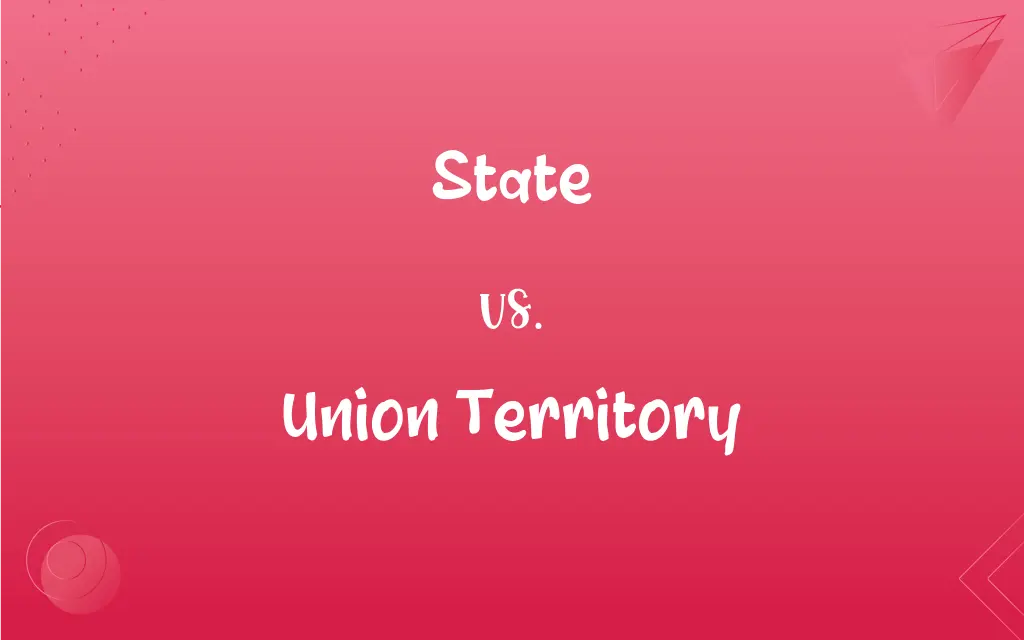State vs. Union Territory: What's the Difference?
Edited by Janet White || By Harlon Moss || Updated on October 26, 2023
A state has its own government with elected representatives; a union territory is directly governed by the central/federal government.

Key Differences
A state is a political entity within a country, typically having its own government, legislature, and judiciary. In contrast, a union territory is a smaller administrative division that is governed directly by the central or federal government of the country.
States usually have more autonomy and powers, as they have their own elected representatives, chief ministers, and legislative assemblies. Union territories, being under the direct control of the central government, may have less autonomy in governance and administrative matters.
In terms of legislative powers, states have the authority to frame their own laws in many areas, while union territories might have limited legislative powers, and the central laws often take precedence in these regions.
The representation in the upper house of the parliament often differs. States usually have a fixed representation based on their size or population. On the other hand, not all union territories might have representation, and if they do, it could be limited.
Financially, states have their own resources and budgets, while union territories might receive financial assistance and budgetary allocations directly from the central government, depending on their revenue generation and expenditures.
ADVERTISEMENT
Comparison Chart
Governance
Own government with elected representatives
Directly governed by the central/federal government
Legislative Powers
Can frame their own laws in many areas
Limited legislative powers
Representation in Upper House
Fixed representation based on size or population
Limited or no representation
Autonomy
More autonomy in governance and administration
Less autonomy
Financial Resources
Has its own resources and budgets
Might receive allocations from the central government
ADVERTISEMENT
State and Union Territory Definitions
State
A specified condition or mode of existence.
The state of the economy is concerning to many.
Union Territory
An administrative division governed directly by the central government.
Delhi is a unique union territory as it also serves as the national capital.
State
A political division within a country with its own government.
The state of New York is known for its iconic city.
Union Territory
An area that might not have its own elected government.
The central government oversees the administration of the union territory of Lakshadweep.
State
A region that possesses sovereign authority and power.
Each state in the U.S. has its own constitution.
Union Territory
A division that might receive financial allocations from the central government.
The union territory of Andaman and Nicobar Islands depends on central funds for many projects.
State
The whole body of people constituting a nation or community.
The head of state addressed the nation today.
Union Territory
A region that might have limited or no representation in the upper house.
Not all union territories have representation in the Rajya Sabha.
State
A particular stage in a process or development.
The company is in a growth state right now.
Union Territory
A region with limited legislative powers compared to states.
The union territory of Chandigarh is known for its planned architecture.
State
A condition or mode of being, as with regard to circumstances
The office was in a state of confusion.
FAQs
What is the main distinction between a state and a union territory?
A state has its own government, while a union territory is directly governed by the central government.
Are states and union territories represented equally in the parliament?
States usually have fixed representation based on size/population, while union territories might have limited or no representation.
Do union territories have their own legislative assemblies?
Some do, but they generally have more limited powers than state assemblies.
Which has more autonomy: a state or a union territory?
States generally have more autonomy compared to union territories.
Do states have their own constitutions?
In some countries like the U.S., states have their own constitutions. In others, they might not.
Who governs the union territories?
Union territories are governed by administrators appointed by the President of the country.
Are the rights of citizens different in states versus union territories?
Citizen rights are generally consistent across states and union territories, based on the country's constitution.
Can a union territory become a state?
Yes, with constitutional amendments, a union territory can be granted statehood.
How many states and union territories are there in India?
As of my last training data in 2022, India has 28 states and 8 union territories.
Can states have their own laws?
Yes, states can frame their own laws in many areas, subject to the country's constitution.
Are union territories smaller than states?
Typically, yes, but it's more about administrative convenience than size.
Do states have a role in foreign policy?
Typically, foreign policy is the domain of the central government, and states/union territories don't play a direct role.
Why would a region prefer to be a state rather than a union territory?
Being a state usually grants more autonomy, legislative powers, and representation in the central government.
Why were union territories created?
Union territories were typically created for regions that were politically or administratively unique and needed direct central governance.
Which has a larger population typically, a state or a union territory?
Generally, states have larger populations than union territories.
Who elects the heads of states?
It varies by country, but often they are elected by the citizens of the state or by the state's legislature.
Can union territories have their own flags?
It depends on the country's laws, but typically union territories don't have separate flags like states might.
How does law enforcement work in union territories?
Law enforcement in union territories is typically under the jurisdiction of the central government.
Do union territories pay taxes to the central government?
Union territories collect taxes, but their financial relations with the central government might differ from states.
Can a state be converted to a union territory?
With necessary constitutional amendments, a state can be re-designated as a union territory.
About Author
Written by
Harlon MossHarlon is a seasoned quality moderator and accomplished content writer for Difference Wiki. An alumnus of the prestigious University of California, he earned his degree in Computer Science. Leveraging his academic background, Harlon brings a meticulous and informed perspective to his work, ensuring content accuracy and excellence.
Edited by
Janet WhiteJanet White has been an esteemed writer and blogger for Difference Wiki. Holding a Master's degree in Science and Medical Journalism from the prestigious Boston University, she has consistently demonstrated her expertise and passion for her field. When she's not immersed in her work, Janet relishes her time exercising, delving into a good book, and cherishing moments with friends and family.
































































